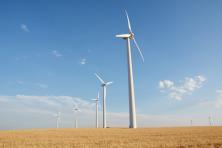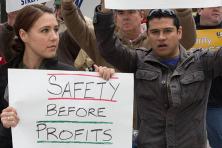For the last several years, Washington State has made great strides in clean energy, energy efficiency, and energy independence. But some legislators want to slow or reverse those advances by weakening the law which has made our progress possible—the Washington State Energy Independence Act, or I-937.
The Energy Independence Act
Approved by Washington voters in 1996, I-937 has done more to protect our climate than any other state policy to date. The law requires large utilities to invest in new renewable energy sources like wind and solar power, and to do everything possible to support energy efficiency—by far the cheapest energy resource. An analysis of carbon pollution reduction policies conducted last year by consulting group Leidos found that between now and 2020, I-937 will result in 7 million tons of carbon emissions reductions.
But reducing pollution reduction is only half the story of I-937’s importance. Private market investments in wind, solar and energy efficiency have been an economic boon to the state. Efficiency improvements have saved Washington ratepayers nearly one billion dollars, and renewable energy development has brought in over eight billion dollars of investment, creating thousands of jobs and millions in local tax revenue. There is no county in the state that has not benefited from I-937.
Innovation in solar, wind and energy efficiency means that the best of I-937 might be yet to come – but the law plateaus in 2020. We must extend and strengthen I-937 to continue building a clean energy economy in Washington. Critics of the law continue to make one-off attempts to weaken its provisions. We cannot afford to poke holes in this successful law without thinking holistically about how we will build on I-937 post-2020 so we need your help, yet again, to tell the legislature not to weaken I-937.
I-937 has already had tremendous benefits for all Washingtonians, we need to build upon our success rather than move backwards by weakening our most successful clean energy law to date.
What’s happening now
In Olympia this month, legislators are considering a number of bills which could weaken I-937’s effectiveness by reducing the law’s renewable energy targets. What we need at this time, is a comprehensive look at how we could further strengthen our clean energy progress to meet Washington’s long-term energy needs.
Our legislators should make sure that any modifications to I-937 maintain the integrity of the law, and support forward-looking, comprehensive proposals. That’s how we can guarantee a clean energy future for Washington State.
Contact your senators and representatives and tell them to oppose weakening I-937.



